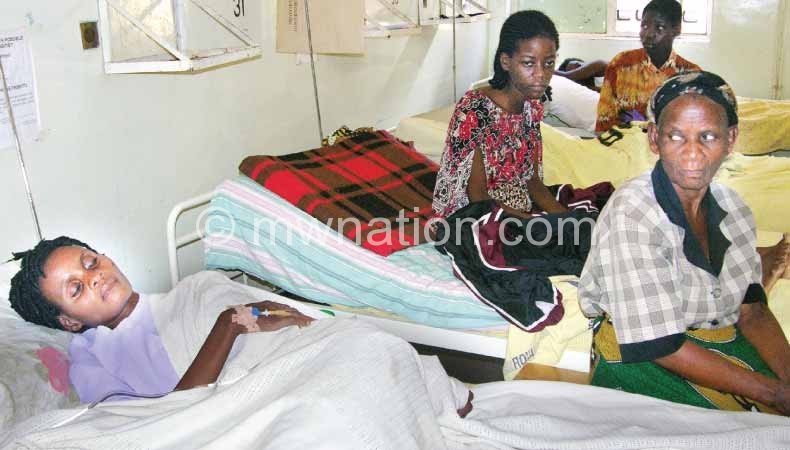Government starves patients
Amid worsening health woes in Malawi’s public hospitals, patients in the country’s hospitals continue to bear the brunt of it—the latest being scaling down of meals in public hospitals from three a day to one.
Hospitals affected include Bwaila District Hospital in Lilongwe, where admitted patients have been told that they will be having one meal a day— from the normal three meals.
Nation on Sunday crew saw several memos from management pasted at wards, informing patients and guardians of the change. The hospital’s chief medical officer Dr. Ethel Lambikani confirmed the development.
“I cannot comment much because we are trying to resolve the situation, the Ministry of Mealth was consulted and informed before a decision was made,” said Lambikani.
The majority of patients at this hospital are those referred from rural health facilities.
Lambikani could not immediately be drawn to comment on the extent of the funding woes that have hit the hospital. He referred further questions on the matter to the Ministry of Health.
However, Minister of Health Jean Kalilani on Saturday said she was not aware of the development in an interview.
“I am hearing it from you. I have no knowledge of that decision. I cannot comment on something I don’t have information on,” said Kalilani.
Ministry of Health spokesperson Adrian Chikumbe, in an e-mail response, attributed the reduction of meals for patients in some hospitals to funding woes, saying Treasury is failing to support the health budget.
He, however, could not give a list of the affected hospitals.
“It is worth observing that when we submit our budgets to Treasury, it is based on need, but these budgets get trimmed based on projections of earnings. However, what is allocated is not necessarily what is given in a month. This puts strain on centres to prioritise on spending,” said Chikumbe.
He, however, said the situation is expected to improve once the funding has improved, insisting that it is not the ministry’s policy to scale down on meal rationing in public hospitals.
“While our investigations confirm that some are doing it probably because of the low levels of funding they are getting, several others have found other ways of averting the scaling down,” said Chikumbe.
True to Chikumbe’s assertion, a highly placed source at Thyolo District Hospital said he is aware that some neighbouring district hospitals have scaled down on provision of meals to patients, but it is not the case at Thyolo.
He said Thyolo District Hospital management has devised measures to ensure that patients are fed accordingly.
“We prioritise the budget for the kitchen so much that all is well and we do not owe any supplier money,” said the source.
National Organisation for Nurses and Midwives of Malawi (Nonm) chairperson Dorothy Ngoma has described the development as a “worrying example of government irresponsibility”.
“We are worried as nurses, the right for health is a basic human right and is guaranteed by our Constitution, but we continue to experience wanton disregard for the right to health by government. Instead of funding the poor’s access to health, what is government doing with our taxes?” Ngoma asked.
She said failure to feed patients can have devastating effects on both patients and the country’s health sector.
“It means their bodies will take longer to heal as they cannot get proper food and in the meantime, the longer they stay in the hospitals, the bigger the crisis in our hospitals as the number of patients will only increase,” she said.
Malawi Equity Health Network (Mhen) executive director Martha Kwataine described the development as a signal of a huge crisis.
“This is a very big crisis. You cannot take medication on an empty stomach. It’s the same hospitals which tell people to eat first before taking drugs.
“As a referral hospital, Bwaila admit very poor people from outside the city, and the sick people cannot work on their own to get food. At stake is not just the right for health, but also the right to life, these people can die,” said Kwataine.
Government is struggling to implement the so-called zero-aid budget after the majority of its traditional donors suspended direct budget aid over rampant corruption and as result severe cuts are being meted out to crucial social services, including hospitals.
Several hospitals are in a crisis, failing to buy ambulances fuel, unable to procure enough essential drugs, among other shortfalls that have exposed the extent of the crisis despite government protestations.
The Minister of Health recently addressed a press briefing to dispel fears of a crisis, but continued incidents such as the scaling down of meals will do little to instil public confidence.






